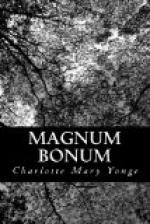Still Aunt Ellen’s presence was a sort of relief, for it made the house less empty and dreary, and she took upon her the cares that were greatly needed in the bereaved household, where old nurse had lost her head, and could do nothing, and the most effective maid was away with the children. So Janet wandered about after her aunt, with an adverse feeling at having her home meddled with, but answering questions and giving opinions, called or uncalled for. Her longing was for her brothers, and it was a great blow to find that her uncle had written to both Allen and Mr. Acton that they had better not come home at present. She thought it cruel and unjust both towards them and herself; and in her sickening sense of solitude and injury she had a vague expectation that they were all going to be left wholly orphans, like the children of fiction, dependent on their uncle and aunt, who would be unjust, and prefer their own children; and she had a prevision of the battles she was to fight, and the defensive influence she was to exert.
That brought to her mind the white slate on which her father had been writing, and she hurried to secure it, though she hardly knew where to go or to look; but straying into her father’s dressing-room, she found both it and the tablets among a heap of other small matters that had been, cleared away when the other chamber had been arranged into the solemnity of the death-room. Hastily securing them, she carried them to her own desk in the deserted school-room, feeling as if they were her charge, and thus having no scruple in reading them.
She had heard what passed aloud; and, as the eldest girl, had been so constantly among the seniors, and so often supposed to be intent on her own occupations when they were conversing, that she had already the knowledge that magnum bonum, was the pet home term for some great discovery in medical, science that her father had been pursuing, with many disappointments and much incredulity from the few friends to whom it had been mentioned, but with absolute confidence on his own part. What it was she did, not know, but she had fully taken in the injunction of secrecy and the charge to hand on the task to one of her brothers; only, while her father had spoken of it as a grave trust, she viewed it as an inheritance of glory; and felt a strange longing and repining that it could not be given to her to win and wear the crown of success.
Janet, did not, however, keep the treasure long, for that very evening Mrs. Lucas sought her out to tell her that her mother had been saying something, about a slate, and Dr. Lucas thought it was one on which her father had been writing. If she could find it, they hoped her mother would rest better.
Janet produced it, and, being evidently most unwilling to let it go out of her hands, was allowed to carry it in, and to tell her mother that she had it. There was no need for injunctions to do so softly and cautiously, for she was frightened by her mother’s dull, half-closed eye, and pale, leaden look; but there was a little air of relief as she faltered, “Here’s the slate, dear mother:” and the answer, so faint that she could hardly hear it, was, “Lock it up, my dear, till I can look.”




